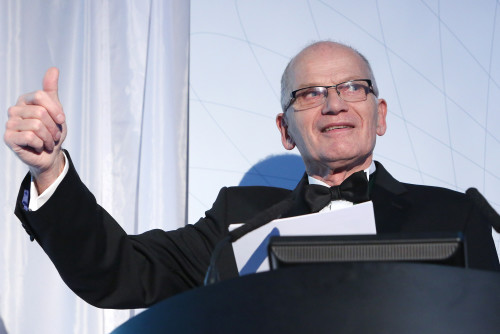Tag archives: Institute of Physics
Science, scepticism and fear at the theatre
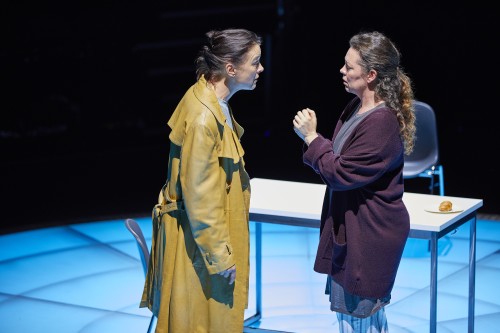
Sceptical siblings: Olivia Williams (left) and Olivia Colman in Mosquitoes by Lucy Kirkwood. (Courtesy: National Theatre/Brinkhoff & Mogenburg)
By Tushna Commissariat
Working at Physics World for the last six years has taken me to some pretty cool labs – everywhere from CERN to the Laser Interferometer Gravitational-wave Observatory (LIGO). My job has allowed me to meet some quite famous people too…at least in the world of physics, that is. But getting to spend a morning at the National Theatre in London watching Olivia Colman and Olivia Williams rehearse for a play is not usual even for me. That is precisely why I jumped at the chance, when I found out that the pair star as sisters in the recently opened play Mosquitoes.
You may be wondering what a play with that moniker has to do with physics. Mosquitoes tells the story of rational and lucid Alice (played by Williams), a particle physicist at the Large Hadron Collider (LHC), and her often-illogical sister Jenny (played by Colman) “who spends a lot of time Googling” and is easily swayed by the bad science she chances upon. Written by Lucy Kirkwood and directed by Rufus Norris – the National Theatre’s current artistic director, the play follows the siblings through a family tragedy, as well as the fairly disastrous switching on of the LHC in 2008, and takes a hard look at our relationships with science, facts, belief and so much more. Kirkwood, whose previous successes include Chimerica and The Children, was commissioned to write the play by the Manhattan Theatre Club as part of its Alfred P Sloan Foundation initiative, which aims to “stimulate artists to create credible and compelling work exploring the worlds of science and technology and to challenge the existing stereotypes of scientists and engineers in the popular imagination”.
View all posts by this author | View this author's profile
Diversity marks Institute of Physics awards dinner
By Matin Durrani
With the winter sun dipping over the horizon late on Tuesday afternoon, I caught the train from Bristol up to London to attend the annual awards dinner of the Institute of Physics (IOP), which publishes Physics World.
The event was held at the Lancaster London hotel a few minutes’ walk from Paddington station. Now, I’m not sure if it was a coincidence, but I found myself seated at dinner next to Farideh Honary, a space physicist from Lancaster University.
View all posts by this author | View this author's profile
The field that could improve your research ‘impact’
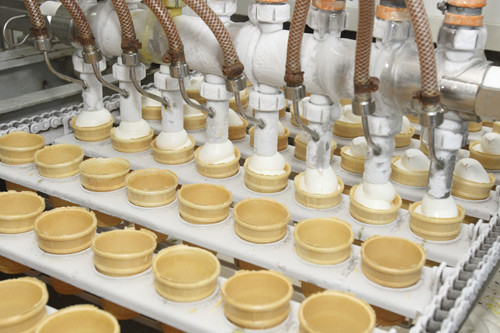
Where physics meets food: preparation of ice-cream in a factory. (Courtesy: iStockphoto/Leonid Shcheglov)
By Matin Durrani
As Physics World editor, I spend most of my time covering science that I have never been involved in. I might write articles about astrophysicists, interview atomic physicists or edit features by particle physicists, but it doesn’t mean I’ve ever done any research in those fields.
It was therefore a pleasant change last Friday to attend a summit organized by the Institute of Physics, which publishes Physics World, on physics in food manufacturing. Back in the 1990s, I did a PhD with Athene Donald at the Cavendish Laboratory in Cambridge on the physical properties of mixtures of gel-forming biopolymers – materials that apart from being interesting from a fundamental point of view are also relevant to the food industry.
Many foods, after all, are complex, multicomponent mixtures – and if you can understand how they behave, then you can create foods that are healthier, cheaper and perhaps even tastier too.
Physics for all: the March 2016 issue of Physics World is now out
By Matin Durrani
Welcome to the March 2016 issue of Physics World magazine, which is ready and waiting for you to access via our app for mobile and desktop.
The new issue looks at ways to make physics a more inclusive discipline, including spotting your unconscious bias, tuning in to talent and tackling “microaggressions” – small acts of injustice that make people uncomfortable because of who they are, not what they do.
We also look at what life’s like for gender and/or sexual minorities at CERN – one of the most international physics labs on the planet – and explore how to find an employer who understands the value of a diverse workforce. There are plenty of practical tips for how you can make a difference.
Progress update in Chinese physics
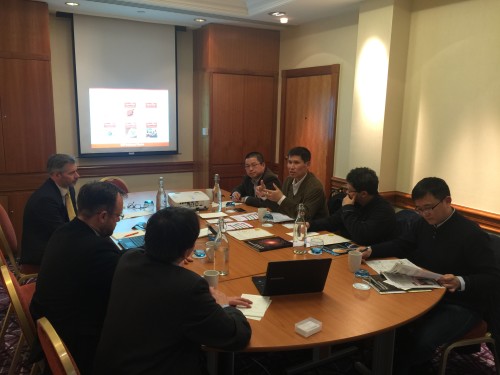
Wenlong Zhan, president of the Chinese Physical Society (second from left on right-hand side) and colleagues, in discussion with Paul Hardaker, chief executive of the Institute of Physics (far left), and colleagues.
By Matin Durrani
China continues to make great progress in physics, with new facilities and projects starting up all the time. Just this week we’ve reported on plans to build a new neutrino experiment at the China Jinping Underground Laboratory (CJPL). The world’s deepest lab, it’s located under a mountain – with about 2400 m of rock cover – in China’s south-western Sichuan province.
Physics World has long kept a close eye on the progress of the physics community in China and in fact we published our first ever special report on the country in 2011. Since then, however, so much more has been going on that we felt it’s time to make a return trip and will be producing another special report in September this year to give you further insights into physics in China.
Laser show lights up Institute of Physics awards dinner

Light me up – the 2015 Institute of Physics awards dinner got off to a spectacular start last night. (Courtesy: Institute of Physics)
By Matin Durrani
And so to London last night to attend the annual awards dinner of the Institute of Physics, which publishes Physics World.
It’s a time when the Institute recognizes physicists who are making a “remarkable contribution” to physics, with awards going to teachers, researchers and businesses – as well as those who’ve served the Institute, shown best practice in professional development, and the university departments that have tackled the under-representation of women in physics. International awards are given too.
It being the International Year of Light, guests were also treated to two spectacular stage shows. Having just settled into our seats, we first watched as three dancers performed in front of lasers, dry ice and strobe lighting (see photo above) – certainly a first for an Institute awards dinner – while after the meal we were treated to a troupe called Feeding the Fish.
Their dancers carry laser batons to create “one-of-a-kind performances that fuse tight choreography with…specialized lighting effects”, with the batons being used to show everything from triangles and butterflies to even the logo of the Institute of Physics. Quite how it all worked certainly had physicists in the audience scratching their heads.
View all posts by this author | View this author's profile
Horsing around with some innovative physics
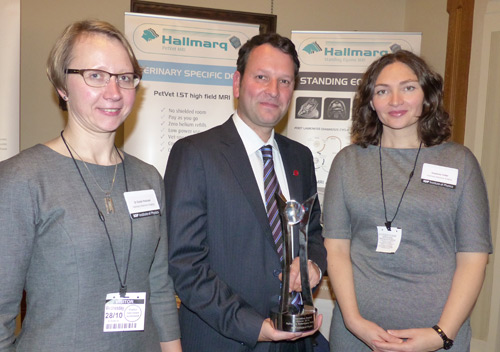
(Left to right) Physicists Giedre Podolyak, Steve Roberts and Snezhana Chater of Hallmarq Veterinary Imaging celebrate their success in the IOP Innovation Awards.
By Margaret Harris
Imagine you’re a veterinarian and a trainer asks you to take a look at a horse. The animal, a champion showjumper, is limping slightly but there is no obvious injury. Exploratory surgery would probably do more harm than good, and the alternative – magnetic resonance imaging (MRI) – isn’t risk-free either. You’d need to put the horse under a general anaesthetic, and you know horses don’t react well to that; in fact, around 0.5% suffer serious injuries while coming round afterwards. And that’s assuming you can even find a scanner big enough to fit a horse. What do you do?
This might sound like a fairly niche dilemma, but for Hallmarq Veterinary Imaging it has become the basis for a thriving business – a business, moreover, that has just won an IOP Innovation Award for the successful application of physics in a commercial product.
At the awards ceremony – which took place last night in the Palace of Westminster, London, just down the hall from the House of Commons chamber – I caught up with Hallmarq’s operations and technical director, Steve Roberts. After sketching out the scenario of the veterinarian and the injured horse, Roberts, a physicist, explained that Hallmarq’s MRI scanner fits around the horse’s leg. This means that equine patients can simply be led into it, sedated but conscious. Sophisticated error-correction and image-processing software helps the scanner compensate for the horse’s movement, and in 15 years of operation, Roberts estimates that veterinarians have used Hallmarq’s machines to scan more than 60,000 horses.
Poetry please, a protein-folding app for your phone, and a new home for the Institute of Physics

Artist’s impression of the new headquarters of the Institute of Physics.
By Hamish Johnston
You may not know it, but you could be a poet.
The European Space Agency (ESA) and the Hubble Space Telescope have just launched a contest to find the best “Ode to Hubble” as part of the celebrations for Hubble’s 25th birthday. Although described as an ode, the contest is actually looking for a short video tribute to Hubble that can include verse, song, prose as well as still and moving images. The piece can either be about the telescope or one of its many discoveries. There are two age categories, one for “generation Hubble” – those born after its launch – and one for over 25s. So look to the stars and get those creative juices flowing.
Celebrating innovation
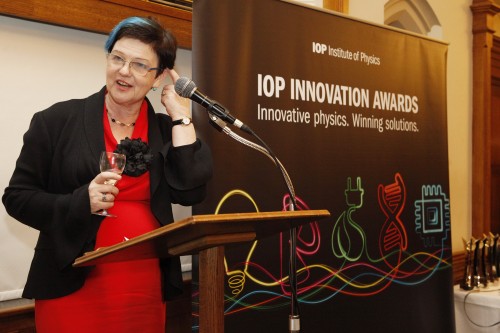
Clever thinking: Baroness Neville-Rolfe celebrates the winners of the 2014 Institute of Physics innovation awards. (Courtesy: Richard Lewis)
By Matin Durrani
“Commercializing physics” is the theme of the November issue of Physics World and it was therefore timely that last night saw a special ceremony at the House of Commons to celebrate the winners of this year’s Innovation Awards from the Institute of Physics (IOP), which publishes the magazine.
The awards, which are now in their third year, are given by the Institute to firms in the UK and Ireland “that have built success on the innovative application of physics”.
Four firms were honoured this year: Gas Sensing Solutions, which makes carbon-dioxide sensors; Gooch & Housego, for an opto-acoustic device that can modulate laser beams for industrial processing; nuclear-power firm Magnox for a clever way of refuelling a reactor at the Wylfa power station; and MBDA for a novel “missile-system upgrade”.
View all posts by this author | View this author's profile
Watch Deborah Jin’s Newton lecture on ultracold gases
By Hamish Johnston
A few weeks ago Deborah Jin was in London to accept the 2014 Isaac Newton Medal and Prize from the Institute of Physics. As is the custom, Jin also delivered the Institute’s Newton Lecture for 2014, which was called “Ultracold gases”. This is an apt title because Jin is an undisputed master in the control and study of gases that have been cooled to temperatures within a whisker of absolute zero.
